捷进英语 Unit 8
Unit 8 知识清单人教版八年级英语上册
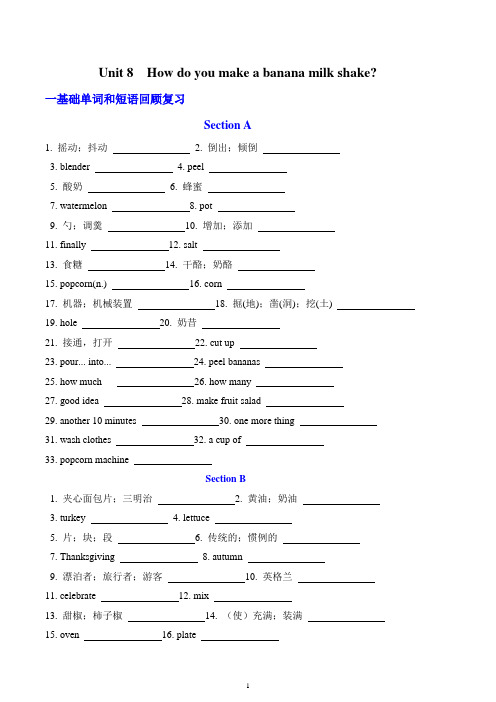
Unit 8 How do you make a banana milk shake? 一基础单词和短语回顾复习Section A1. 摇动;抖动2. 倒出;倾倒3. blender4. peel5. 酸奶6. 蜂蜜7. watermelon 8. pot9. 勺;调羹 10. 增加;添加11. finally 12. salt13. 食糖 14. 干酪;奶酪15. popcorn(n.) 16. corn17. 机器;机械装置 18. 掘(地);凿(洞);挖(土)19. hole 20. 奶昔21. 接通,打开 22. cut up23. pour... into... 24. peel bananas25. how much 26. how many27. good idea 28. make fruit salad29. another 10 minutes 30. one more thing31. wash clothes 32. a cup of33. popcorn machineSection B1. 夹心面包片;三明治2. 黄油;奶油3. turkey4. lettuce5. 片;块;段6. 传统的;惯例的7. Thanksgiving 8. autumn9. 漂泊者;旅行者;游客 10. 英格兰11. celebrate 12. mix13. 甜椒;柿子椒 14. (使)充满;装满15. oven 16. plate17. 遮盖;覆盖物 18. 接待;服务;提供19. gravy 20. temperature(n.)21. 一片面包 22. on special holidays23. 在11月的第四个星期四 24. one way to make turkey 25. 把火鸡切成薄片 26. cover...with...27. 用...装满 28. one by one29. 混合在一起 30. have a big meal二短语归纳milk shake turn on pour…into…a cup of yogurt a good ideaon Saturday cut up put…into… one more thing a piece ofat this timea fewfill… with…cover…with… one by onea long timehow many+可数名词复数how much+不可数名词It’s time (for sb.)+to do sth. First…Next…首先…接下来…Then…Finally…然后….最后…want + to do sth.forget+to do sth.how + to do sth.need+to do sth.make+宾语+形容词使……怎样let sb. +do sth.三语法讲解1. How do you make a banana milk shake? 怎样制作一份香蕉奶昔?解析:shake (n) 摇动;抖动(v)(使)摇动/颤抖过去式短语:shake off 抖落shake hands 握手shake one’s head 摇头for a shake 一瞬间饮用之前请摇一下瓶子。
捷进英语课文翻译
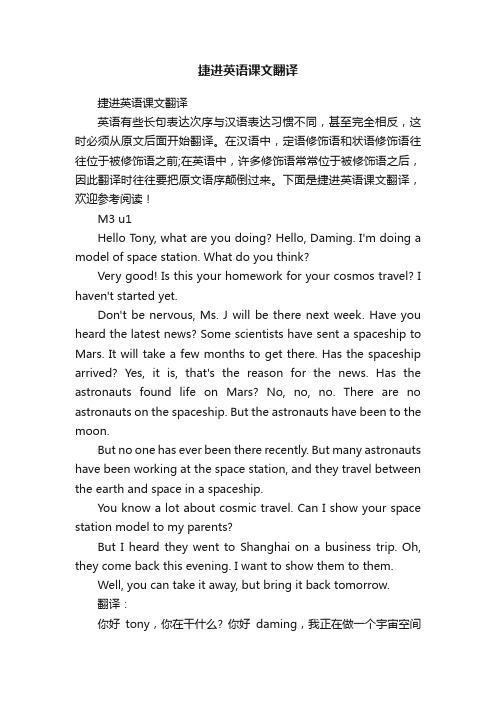
捷进英语课文翻译捷进英语课文翻译英语有些长句表达次序与汉语表达习惯不同,甚至完全相反,这时必须从原文后面开始翻译。
在汉语中,定语修饰语和状语修饰语往往位于被修饰语之前;在英语中,许多修饰语常常位于被修饰语之后,因此翻译时往往要把原文语序颠倒过来。
下面是捷进英语课文翻译,欢迎参考阅读!M3 u1Hello Tony, what are you doing? Hello, Daming. I'm doing a model of space station. What do you think?Very good! Is this your homework for your cosmos travel? I haven't started yet.Don't be nervous, Ms. J will be there next week. Have you heard the latest news? Some scientists have sent a spaceship to Mars. It will take a few months to get there. Has the spaceship arrived? Yes, it is, that's the reason for the news. Has the astronauts found life on Mars? No, no, no. There are no astronauts on the spaceship. But the astronauts have been to the moon.But no one has ever been there recently. But many astronauts have been working at the space station, and they travel between the earth and space in a spaceship.You know a lot about cosmic travel. Can I show your space station model to my parents?But I heard they went to Shanghai on a business trip. Oh, they come back this evening. I want to show them to them.Well, you can take it away, but bring it back tomorrow.翻译:你好tony,你在干什么? 你好daming,我正在做一个宇宙空间站模型,你觉得怎么样?非常好!这是你宇宙旅行家庭作业么?我还没开始呢。
Unit 8 知识点详解及练习 人教版英语九年级全册

Unit8 It must belong to Carla.1. attend /əˈtend/ v. 出席;参加辨析:attend, join, take part in用attend, join, take part in填空(1) When did your brother________ the army?(2) We should__________ school activities.(3) I _________ his lecture yesterday.参考答案:(1) join (2) take a part in (3) attended2. belong to 属于(1) The book must . She’s the only one who’s studying French.A. belong to Li Ying’sB. be Li YingC. belong Li Ying’sD. belong to Li Ying(2) As is known to us all, China is a developing country ______ the third world.A. belongingB. belongedC. belonging toD. belonged to参考答案:(1)D (2)C3. valuable /ˈvæljuəbl/ adj. 有价值的;贵重的,宝贵的Peter’s father asked him to spend his time on something ______ researching into instead of playing all the time.A. worthyB. valuableC. worthD. precious参考答案:C4. noise /nɔɪz/ v. 噪音辨析:noise; sound与voice用noise; sound与voice填空(1)Don’t speak in such a high__________.(2)Will you please make less__________,boys and girls?(3)We couldn’t hear a_________here.参考答案:(1)voice (2)noise (3)sound5. sleepy /'sliːpɪ/ adj. 困倦的;瞌睡的辨析:sleepy; asleep与sleep(1) —Why are you looking _______ in class all day?—Because I can’t finish my homework until eleven every night.A. awakeB. asleepC. sleepingD. sleepy(2) 选词填空:sleepy; asleep与sleepI often ________ for 8 hours every night.My father fell ________ while he was reading a book.The little boy couldn’t go on studying because he felt ________.参考答案:(1)D (2)sleep; asleep; sleepy6. information /ɪnfə'meɪʃ(ə)n/ n. 信息;消息information 意为“信息、消息”是不可数名词所以没有复数形式,只能够用a lot of, much, little 等词修饰。
Unit8知识点与练习.doc

1 .Christmas 圣诞节5. thing 东西,物品9.stocking 长筒袜13.pudding 布丁17.message 信息,消息21.letter 信2.buy 买 6.pretty 漂亮的 lO.finally 最后14.all 全部3.prcscnt 礼物 7. put 放 11 .early 早早地15.card 卡片 18.song 歌曲 19.him 他 22.storybook 故事书4.ncxt 接着,然后 8.1ook 看起來 12.turkey 火鸡;火鸡肉 16.children 孩子,儿童 我们23.after 在…以后5.去看圣诞老人 go to see FatherChristmas7.(在)平安夜(on) Christmas Eve9.圣诞快乐! Merry Christmas!11 •等待礼物 wait for presents13.早早醍来 wake up early 15.画画 draw a picture/ draw pictures17.给他写封信 write him a letter Unit 8 At Christmas 知识汇总一、单词二、短语 1 •玩得开心,过得愉快,玩得高兴have a good time /have a lot of fun2. 在圣诞节 at Christmas = on Christmas Day3.看起來很棒/伤心 look great/sad4. 买礼物给某人 buy presents for sb. ( buy presents for me/you/him/her/us/my parents/Mike...)6.在圣诞树 b under the Christmas tree &唱圣诞歌曲 sing Christmas songs 10.放一些好看的东西 put some pretty things 12.吃一顿丰盛的午餐/晚餐have a big lunch/dinner 14.对折一张卡片fold a card16.写上你的信息 write your message1 &放学后 after school 19.把果汁弄到我的夹克衫上get juice on my jacket 20.向上跳jump up三、 句了1. What do we usually do on Christmas Day ?圣诞节,我们通常干什么? 2 .First, we go shopping. 首先,我们去购物。
2019-2020人教版八年级英语上册unit8基础知识点期末复习和训练(含答案)
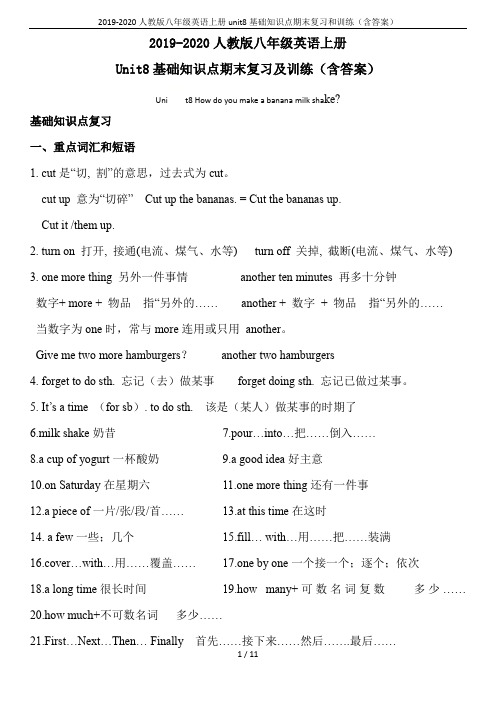
2019-2020人教版八年级英语上册Unit8基础知识点期末复习及训练(含答案)Uni t8 How do you make a banana milk sha ke?基础知识点复习一、重点词汇和短语1. cut是“切, 割”的意思,过去式为cut。
cut up 意为“切碎”Cut up the bananas. = Cut the bananas up.Cut it /them up.2. turn on 打开, 接通(电流、煤气、水等) turn off 关掉, 截断(电流、煤气、水等)3. one more thing 另外一件事情another ten minutes 再多十分钟数字+ more + 物品指“另外的…… another + 数字+ 物品指“另外的……当数字为one时,常与more连用或只用another。
Give me two more hamburgers?another two hamburgers4. forget to do sth. 忘记(去)做某事forget doing sth. 忘记已做过某事。
5. It’s a time (for sb). to do sth. 该是(某人)做某事的时期了k shake奶昔7.pour…into…把……倒入……8.a cup of yogurt一杯酸奶9.a good idea好主意10.on Saturday在星期六11.one more thing还有一件事12.a piece of一片/张/段/首……13.at this time在这时14. a few一些;几个15.fill… with…用……把……装满16.cover…with…用……覆盖…… 17.one by one一个接一个;逐个;依次18.a long time很长时间19.how many+可数名词复数多少……20.how much+不可数名词多少……21.First…Next…Then… Finally 首先……接下来……然后…….最后……22.want + to do sth.想要做某事23.forget+to do sth.忘记去做某事24.how + to do sth.如何做某事25.need+to do sth.需要做某事二、重点句型1. It’s a time (for sb). to do sth. 该是(某人)做某事的时期了2. First…Next…Then… Finally 首先……接下来……然后…….最后……3. Most Americans still celebrate this ideas of giving thanks by having a big meal.by +sth./doing :(1)以…...方式I study English by listening to English songs.(2)在...…的旁边I am sitting by the pool.(3)在...…之前I have to go to school by 8:00.(4)搭乘I go to school by bus.4. How do you make a banana milk shake? 你怎样制作一份香蕉奶昔?5. These days, most Americans still celebrate this idea of giving thanks /by having a big meal at home with their family.现在,大部分的美国人仍然通过和家人在家里共进丰盛的一餐来庆祝这个感恩的节日。
2020人教版八年级英语上册Unit 8例题讲解
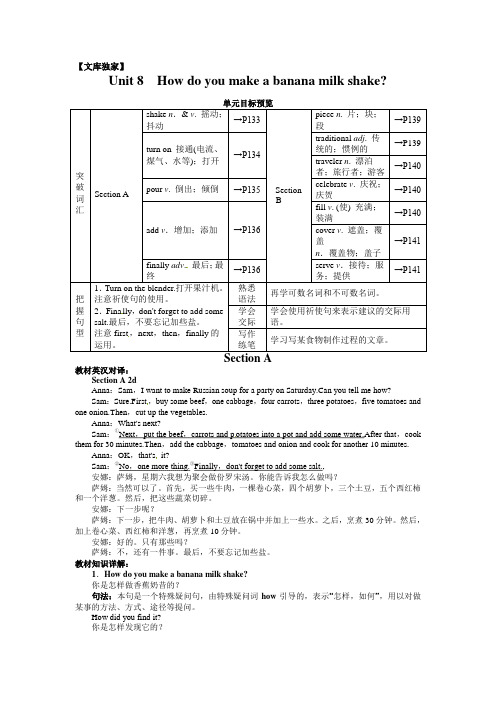
【文库独家】Unit 8How do you make a banana milk shake?单元目标预览突破词汇Section Ashake n.& v. 摇动;抖动→P133SectionBpiece n. 片;块;段→P139turn on 接通(电流、煤气、水等);打开→P134traditional adj. 传统的;惯例的→P139traveler n. 漂泊者;旅行者;游客→P140 pour v. 倒出;倾倒→P135celebrate v. 庆祝;庆贺→P140 add v.增加;添加→P136fill v. (使) 充满;装满→P140cover v. 遮盖;覆盖n.覆盖物;盖子→P141finally adv.最后;最终→P136serve v.接待;服务;提供→P141把握句型1.Turn on the blender.打开果汁机。
注意祈使句的使用。
2.Fina lly,don't forget to add somesalt.最后,不要忘记加些盐。
注意first,next,then,finally的运用。
熟悉语法再学可数名词和不可数名词。
学会交际学会使用祈使句来表示建议的交际用语。
写作练笔学习写某食物制作过程的文章。
Section A教材英汉对译:Section A 2dAnna:Sam,I want to make Russian soup for a party on Saturday.Can you tell me how?Sam:Sure.First,buy some beef,one cabbage,four carrots,three potatoes,five tomatoes and one onion.Then,cut up the vegetables.Anna:What's next?Sam:①Next,put the beef,carrots and p otatoes into a pot and add some water.After that,cook them for 30 minutes.Then,add the cabbage,tomatoes and onion and cook for another 10 minutes.Anna:OK,that's it?Sam:②No,one more thing.③Finally,don't forget to add some salt.,安娜:萨姆,星期六我想为聚会做份罗宋汤。
人教版九年级英语第八单元Unit8(知识点+习题)

Unit8 It must belong to Carla一、短语归纳1. belong to⋯2.go to/attend a concert3.something valuable/unusual/strange4.the rest of....5.pick it up6.each other=one another7.go to a picnic=go for a picnic8.be interviewed by...9.strange noises10.at first11.run away12.feel uneasy13.have no idea=don't know14.have fun doing sth.15. There must be⋯doing sth.16.run after17.wear a suit18.express a difference / result19.add information20.at the same time21.most famous historical places22. a group of⋯municate with ...24.so many centuries ago25.point out26.on midsummer's morning27. the center of ...⋯⋯28. move up二、知识点讲解1.belong to 属于(=be)It must belong to Carla. = It must be Carla's.※练一练①The notebook must be my friend's(.同义句)The notebook must __________ _______ my friend.② The book must be Jim's(. 否定句)The book _________ ________ Jim's.③The book on the chair must belong to ________. Her name is on the cover.A. herB. hersC. sheD. him2.attend a concert 参加音乐会(go to concert去听音乐会)【比较应用】attend 主要指以观众或听众的身份参加婚礼,丧礼,会议或讲座或上课。
九年级人教版英语U8知识点

九年级人教版英语U8知识点Unit 8 Knowledge Points in Grade 9 People's Education Press English TextbookIntroduction:In the ninth grade English curriculum, students are introduced to Unit 8, which focuses on various knowledge points. The unit covers topics such as travel, adventure, and famous destinations. Through studying these knowledge points, students enhance their language skills and cultural understanding. This article aims to explore the key aspects of Unit 8 in the Grade 9 People's Education Press English textbook.1. Vocabulary Expansion:One of the essential components of Unit 8 is vocabulary expansion. Students learn new words related to travel, such as "destination," "passport," "souvenir," and "itinerary." Building a strong vocabulary enables students to communicate effectively and express their ideas clearly. Moreover, it broadens their understanding of different cultures and enhances their reading and writing skills.2. Verb Tenses:Verb tenses play a significant role in conveying accurate information in English. In Unit 8, students review and practice using various verb tenses, including past simple, present perfect, and future tenses. By understanding and applying these verb tenses correctly, students can express actions, events, and experiences accurately. For instance, they can describe their past holiday experiences, discuss their plans for future trips, and talk about ongoing adventures.3. Speaking Skills:Developing speaking skills is crucial for effective communication. Unit 8 provides opportunities for students to practice speaking by engaging in discussions about travel experiences, asking and answering questions about famous landmarks, and planning hypothetical trips. These activities encourage students to express their opinions, enhance their fluency, and foster their ability to communicate confidently in English.4. Reading and Writing:Unit 8 includes various reading and writing activities to improve students' comprehension and composition skills. Reading passages about different travel destinations not only improve their reading speed but also expose them to diverse cultures and places around the world. Writing exercises, such as composing trip itineraries or travel reviews,enhance students' ability to organize their thoughts and create coherent written pieces.5. Listening Comprehension:Listening comprehension is a crucial aspect of language learning. Unit 8 presents listening activities that focus on understanding details, main ideas, and context. Students listen to conversations, interviews, and stories related to travel and adventure, improving their listening skills and familiarizing them with different accents and communication styles.6. Culture and Geography:Unit 8 incorporates cultural and geographical aspects into the learning process. Students gain insights into famous landmarks, iconic cities, and renowned travel destinations worldwide. By learning about different cultures and geographical locations, students develop cultural sensitivity, broaden their horizons, and appreciate the diversity of our world.7. Group Work and Collaboration:Unit 8 encourages students to work in groups or pairs, promoting collaboration and teamwork. Activities like planning a dream vacationwith a partner or discussing the pros and cons of adventure travel foster a supportive learning environment. Working together not only enhances their language skills but also helps students develop social and interpersonal skills.Conclusion:Unit 8 in the Grade 9 People's Education Press English textbook is designed to expand students' vocabulary, improve their language skills, and deepen their cultural understanding. Through this unit, students gain knowledge about travel, adventure, famous destinations, and diverse cultures. With enhanced speaking, listening, reading, and writing skills, students become confident English communicators ready to explore the world. As they progress to higher grades, this solid foundation sets them up for successful language acquisition and cultural awareness.。
人教版新课标八年级上册英语Unit 8知识点归纳
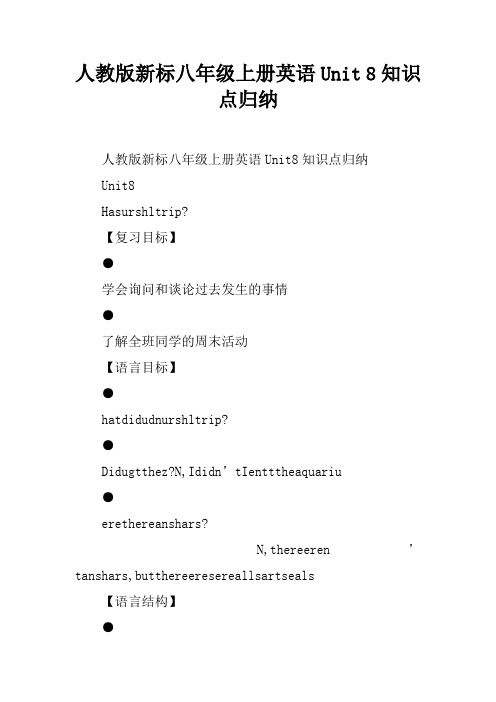
人教版新标八年级上册英语Unit 8知识点归纳人教版新标八年级上册英语Unit8知识点归纳Unit8Hasurshltrip?【复习目标】●学会询问和谈论过去发生的事情●了解全班同学的周末活动【语言目标】●hatdidudnurshltrip?●Didugtthez?N,Ididn’tIentttheaquariu●erethereanshars?N,thereeren’tanshars,butthereeresereallsartseals【语言结构】●规则动词和不规则动词的一般过去式●一般过去时的肯定句和否定句●Didu,erethere引导的一般疑问句【重点词汇】●aquariu,sieneenter,giftshp,/seal,shar,tpus●ate,t,hungut,gt,/gfradrive,sleeplate,ardsale,daff 【应掌握的词组】talabut谈论,talver谈论2giveatal作报告3haveataltsb与某人谈话4gtthebeah去海滩haveierea吃冰淇淋6gtthez去动物园7gttheaquariu去水族馆8hangutithne’sfriends和朋友闲逛9taephts=taeapht=taepitures=taeapiture照相0buasuvenir买纪念品1havepizza吃比萨饼2afausatr著名的演员3getne’sautgraph得到了某人的亲笔签名4inaprize赢得奖品(奖项)attheaquariu在水族馆6haveagreattie玩得高兴,过得愉快7ntheshltrip在学校的旅游8BlueaterAquariu蓝色水族馆9theVisitrs’enter游客中心20adlphinsh海豚表演21afterthat后来22attheendf…在……结束的时候,在……的尽头23theGiftShp礼品店24atthebeginningf…在开始的时候2aterribleshltrip糟糕的学校旅行26thatsundsinteresting那听起来很有趣27aeupastr编一个故事28gfradrive开车兜风30intherain在雨中inthedar在黑暗中\inthesun在阳光下inthesn在雪中31taentesf=ritedn=pdn写下,记下32havefundingsth很快乐的做某事33plaputergaes打电脑游戏34frsale供销售3seeusn盼望很快见到你36inne’spinin据某人看来,某人的观点上看37inthefirstprize获得了一等奖38afausbasetballplaer著名的篮球运动员39inthefuture在将来,今后40an’thelpdingsth忍不住做某事41thestrgesthat…据说……42abusdaff繁忙的假日,inne’sffhurs在某人的休息时间theffseasn淡季43nnef………当中没有一个44aheavrain一阵大雨alightrain一阵小雨afinerain一阵细雨44allda=alldalng整天allnight=allnightlng整夜【应掌握的句子】Hasurshltrip?你的学校旅行怎么样?翻译:今天天气怎么样?前天天气怎么样?你的假日怎么样?2Talabuteventsinthepast谈谈过去的事。
捷进英语Unit电子教案优选

This section should take less time than section A as the texts are less complicated. They focus on developing students’ everyday reading skills as they are reading and responding to comments on an article.
(1)Practice ignoring proper nouns
(2) Students discuss other accidental inventions
Refer students back to the inventions fromReading for Doing. If you have had time, between classes you could set students the task of finding out more about each invention e.g. when was it invented, where and by who.
捷进英语 Unit 8
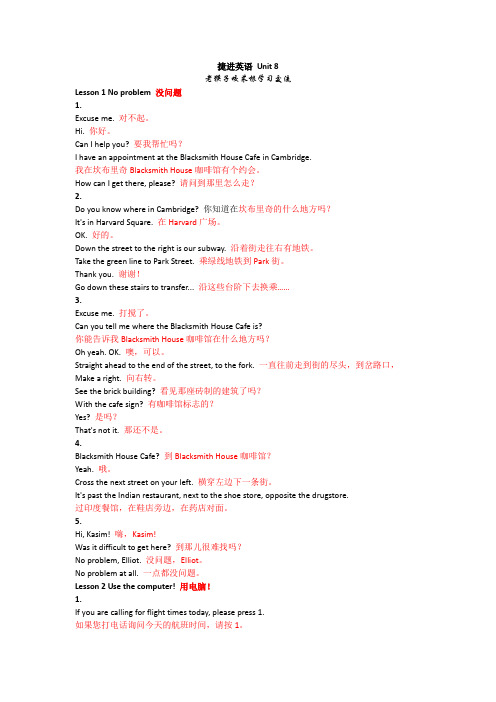
捷进英语Unit 8老猴子咬菜根学习交流Lesson 1 No problem 没问题1.Excuse me. 对不起。
Hi. 你好。
Can I help you? 要我帮忙吗?I have an appointment at the Blacksmith House Cafe in Cambridge.我在坎布里奇Blacksmith House咖啡馆有个约会。
How can I get there, please? 请问到那里怎么走?2.Do you know where in Cambridge? 你知道在坎布里奇的什么地方吗?It's in Harvard Square. 在Harvard广场。
OK. 好的。
Down the street to the right is our subway. 沿着街走往右有地铁。
Take the green line to Park Street. 乘绿线地铁到Park街。
Thank you. 谢谢!Go down these stairs to transfer... 沿这些台阶下去换乘……3.Excuse me. 打搅了。
Can you tell me where the Blacksmith House Cafe is?你能告诉我Blacksmith House咖啡馆在什么地方吗?Oh yeah. OK. 噢,可以。
Straight ahead to the end of the street, to the fork. 一直往前走到街的尽头,到岔路口,Make a right. 向右转。
See the brick building? 看见那座砖制的建筑了吗?With the cafe sign? 有咖啡馆标志的?Yes? 是吗?That's not it. 那还不是。
4.Blacksmith House Cafe? 到Blacksmith House咖啡馆?Yeah. 哦。
最新人教版九年级英语第八单元Unit8(知识点+习题)
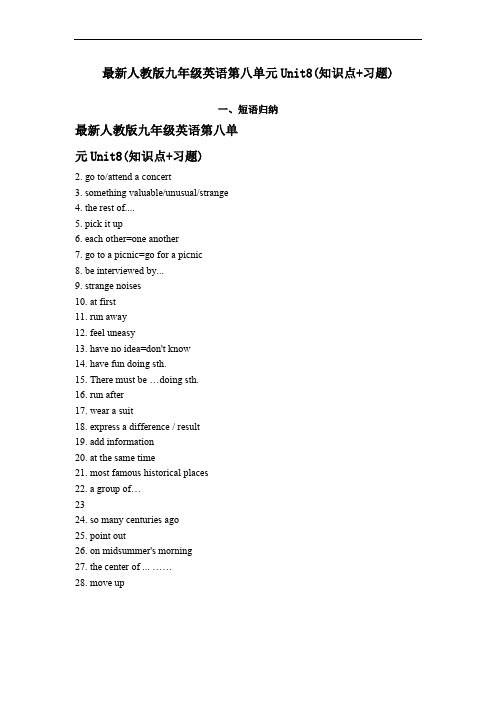
最新人教版九年级英语第八单元Unit8(知识点+习题)一、短语归纳最新人教版九年级英语第八单元Unit8(知识点+习题)2. go to/attend a concert3. something valuable/unusual/strange4. the rest of....5. pick it up6. each other=one another7. go to a picnic=go for a picnic8. be interviewed by...9. strange noises10. at first11. run away12. feel uneasy13. have no idea=don't know14. have fun doing sth.15. There must be …doing sth.16. run after17. wear a suit18. express a difference / result19. add information20. at the same time21. most famous historical places22. a group of…2324. so many centuries ago25. point out26. on midsummer's morning27. the center of ... ……28. move up最新人教版九年级英语第八单元Unit8(知识点+习题)1. belong to 属于(=be)It must belong to Carla. = It must be Carla's.※练一练① The notebook must be my friend's.(同义句)The notebook must __________ _______ my friend.② The book must be Jim's.(否定句)The book _________ ________ Jim's.③ The book on the chair must belong to ________. Her name is on the cover.A. herB. hersC. sheD. him2. attend a concert参加音乐会(go to concert 去听音乐会)【比较应用】attend主要指以观众或听众的身份参加婚礼,丧礼,会议或讲座或上课. join in参加某项活动,尤指参加正在进行的活动.join 参加某个组织、党团、俱乐部等机构,成为其中一员.take part in参加某些活动或工作,在其中起了作用.(可和join in 互换)※练一练Mr. John invited many friends to _______ his wedding.A. take part inB. joinC. join in D attend3. anything valuable贵重的东西当形容词修饰something,anything,nothing,everything等复合不定代词时,后置.something unusual anything strange nothing important※练一练In this book,you can learn________.A. something educationalB. educational somethingC. anything educationalD. educational anything4. the rest of my friends 我剩下的朋友the rest of... (剩余的……)作主语,谓语动词的单复数由of 后边的名词决定.※练一练①The rest of the books_____dull.②The rest of oil _____not enough.5. ...must have picked it up. ……一定是捡起它了.⑴must have done sth(过去一定做某事了)表示对过去的事情的推测⑵pick up捡起(代词放中间)※练一练When he saw a wallet on the ground,he _______ at once.A. picked it upB. gave it upC. picked up itD. worked it out6. happen与take place 发生(无被动式)⑴ happen 特别指那些偶然或未能预见的事件发生.Sth. happened to sb.某人发生了某事Sb. happened to do sth.某人碰巧做某事⑵ take place 指某事按计划进行或按计划发生.★take place有“举行”之意,而happen有“碰巧”的意思.※练一练①A strange thing happened _____ her last night,so she is afraid to stay at home alone tonight.A. atB. forC. withD. to②Great changes _________________(发生)in China since the last thirty years.③The meeting _________________(举行)next Friday.④ _________________(碰巧)that I had no money on me.7. There must be something visiting the homes. 一定有什么东西光顾这些住户.⑴There be+主语+doing sth.有某人(物)正在做某事(表存在)There are some people surfing on the sea,aren't there?There is a cat eating fish in the corner.⑵There must be +主语+doing 一定有某人(物)正在做……(对某种存在的推测)There must be someone playing the violin there. 准有人在那里拉小提琴.※练一练①There _____________________________________________ in the forest.一定有人在森林里砍树.②There _______________________________ in the tree.树上有只鸟儿在唱着歌.8. feel sleepy 感动困乏sleepy adj. 困乏的,昏昏欲睡的sleepy expression(懒洋洋的表情)asleep adj. 睡着的(表语形容词)fall/be asleep①In spring,people often feel_________(sleep)②I didn't have a good_____ last night,so I was ______ and I fell _____ in class.A. sleep; asleep; sleepB. asleep; sleep; sleepyC. sleep; sleepy; asleepD. sleepy; sleep; asleep9. ...not only one of Britain's most famous historical places but also one of its greatest mysteries.⑴not only... but also...不但……而且……⑵either... or... 要么……要么……;不是……就是……(两者选择其一)⑶neither... nor...既不……也不……(两者都不)⑷both... and... ……和……(两者)都这四组连词都可以用来连接两个性质相同的并列成分,作主语、谓语、宾语或表语等,但⑴⑵⑶在连接句子主语时,谓语动词采取“就近原则”.both... and... 连接两个主语时,谓语动词通常用使用复数形式.Neither he or she works here. 他和她都不在这里工作.(主语)你要么跟我一块去,要么走回家去.(谓语)I have neither time nor money. 我既没时间也没钱.(宾语)He is not only a teacher,but also an actor. 他不仅是一名教师,也是一位演员.(表语)Either you or I am wrong. 不是你错就是我错.(表语)You may stay either in a hotel or in a private house. 你可以住在饭店或私人的家里.(地点状语)g back either today or tomorrow. 她不是今天来就是明天来.(时间状语)※练一练①Both my father and my mother _____(be )teachers hard.②-I hear _____ your father _____ your mother likes watching Beijing Opera.-Yes,they both love it very much.A. both; andB. either; orC. Neither; norD. not only; but also③Not only my friends but also I _____ interested in football and Messi is our favorite star.A. beB. amC. isD. are④ Would you like some juice or coffee?-_____ is OK. I really don't care.A. BothB. EitherC. NeitherD. All⑤ Both Tom and Lucy like music that is relaxing. (改为否定句)______ Tom______ Lucy ______ music that is relaxing.⑥ Would you like some juice or coffee?-______. I really don't mind.A. EitherB. NeitherC. Both D All★not only … but also连接两个分句时,not only可用于句首,第一个从句主谓要倒装.Not only is he clever,but also he is hard working.10. ... another popular idea. 另一个受欢迎的主意.【迷津点拨】other,the other,others,the others,another⑴ other adj.别的,其他的pron. 其余的(人或事物)Do you have any other question(s)?We need to help each other.⑵ the other特指两者中的另一个.经常构成:one... the other...(the other = the other +单数名词)He has two daughters. One is a nurse,the other is a worker.⑶others 特指某一范围内的人或物除去一些外,剩下部分中的另一些(不是全部).经常构成:some... others... ,others...Some of us like singing and dancing,others like sports,others like....有时也泛指其他的人或物:We must help others.(我们必须帮助别人.)⑷ the others 特指某集体中除了一个(些)后,剩下的部分(全部).the others = the other +复数名词Two boys will go to the zoo,and the others will stay at home.⑸ another 泛指同类事物中(三者或三者以上或数量不明)另一个.经常构成: one... another... ,another...(another = another +单数名词)I don't like this one. Please show me another.★表示“再、又,还”时:another +基数词+名词复数=基数词+ more +名词复数I'll be here for another two weeks/two more weeks.※练一练① These cakes are very delicious,I want to have_____ one.A. otherB. the otherC. othersD. another②Many people are in the zoo. Some are watching animals,and ______ are taking photos.A. the otherB. the othersC. othersD. another.③New Zealand has two islands. One is North Island and ______ is South Island.A. anotherB. the other C other D. the others11. 含有way的短语in the way 妨碍;挡道in the way of 防碍……in a certain way 按一定的方法in a/some way(s) 在某方面,在某种程度(意义)上,以某种方式by the way 顺便说一下on the way(to.. )在(去……)的路上go out of one's way 格外努力※练一练The car is _____,can you park it to another place?A. in the wayB. by the wayC. in the endD. in style12. ...prevent illness and keep people healthy. 预防疾病和保持人们健康.prevent sb. (from) doing sth. =stop sb. (from) doing sth.★keep sb. doing让某人一直做某事※练一练①Plants prevent the sun from ____________(make)the earth drier.②The heavy rainstorm stopped him from returning. (同义句)The heavy rainstorm ___________ him _______ ______________.③She closed the gate to prevent the dog ____ going out of the garden.A. atB. onC. ofD. from13. ...it receives more than 750,000 visitors.receive 收到;接到(被动)accept 接受;接纳(主动)He received the present,but he didn't accept it. 他收到了礼物,但没有接受. ※练一练①On her birthday ,she ____ a gift from a boy,but she didn't _____ it.A. received ,receiveB. accepted ; acceptC. received ; acceptD. accepted ; receive②His family are worried about him because they haven't _______ letters from him for a long time.A. acceptedB. receivedC. writtenD. collected三、语法回顾(肯定猜测和否定猜测)⑴must一定,肯定(可能性100%,疑问、否定用can,can't)⑵may/could可能,也许(可能性50%,疑问否定用could,couldn't)⑶ might有可能,差不多(可能性30%)※练一练① Whose T-shirt is this?-It_______ be John's. It's ________small for himA. can't ; much tooB. can't; too muchC. mustn't ; too muchD. mustn't ; much too② I hear that Bob is in hospital. He ______be ill.A. mustB. shouldC. wouldD. can't③ This could be Robert's basketball.(提问)_________ basketball _________ this _______?四、课后作业作业①:习题单项选择.一、( )31. — Tony is ________ man.— Yes. He is the tallest in his class.A. quite a tallB. a quite tallC. quite tall aD. tall a quite( )32. — ________ books are these?— I am not sure. They may belong to Peter.A. WhichB. WhoC. WhoseD. Whom( )33. — The famous star was interviewed ______ the local newspaper.— Yes,I also heard the news.A. ofB. byC. asD. with( )34. —What’s Lily’s favorite color?— _____.A. PianoB. PandaC. PieD. Pink( )35. —Don’t throw these books. They may be ________ to you.—OK. I won’t.A. convenientB. awfulC. valuableD. useless( )36. — Carl,________ are you late for school?— Because my bike is broken.A. whyB. whenC. howD. where( )37. There are ________ stars in the sky.A. millionsB. millions ofC. million( )38. — Did you _________ the letter from your pen pal?— No,I didn’t.A. avoidB. reportC. writeD. receive( )39. — Edison was one of _______ inventors in the world.— Yes,I agree.A. the greaterB. greaterC. the greatestD. greatest( )40. — Can he help us?—I’m not sure. He ________ help us solve this mystery.A. mightB. mustC. shouldn’tD. mustn’t( )41. — The visitors knew little about the island when they ________ there.— Really? What did they do first?A. arriveB. have arrivedC. would arrive( )42. — He has never seen the movie,________?— No,he hasn’t.A. is heB. has heC. isn’t heD. hasn’t he( )43. Not only you but also he _______ on well with the new students.A. getB. gettingC. getsD. to get( )44. I hear ________ he will be back in two days.A. thatB. whereC. ifD. when( )45. — Whose baseball is this?— ________ He loves baseball.A. So do I.B. I enjoy playing baseball.C. I don’t know.D. It must be Nick’s.二、完形填空.Justin and Mary woke up early. 46 told them about a monster that haunted (怪兽出没) the lake D. tall a quite D. million of D. arrived yesterday. It was only 5:00 AM,so 47 else in the house was still asleep. Mary and Justin went to the boat dock (码头). It was too foggy (有雾的) to 48 anything. Do you think Uncle Thomas was just trying to scare (惊吓) us?” Justin said. Mary said,“ 49 what he said? The monster haunts the lake. The people in the story were in 50 .” “You want to go out on the water? Mom will be angry,” Justin said. “Maybe we don’ t have togo anywhere. We 51 sit in the boat while it’ s docked (停靠码头). That would be safe,” Mary said. Justin carefully climbed into the boat first. Then Mary climbed into the boat and sat 52 him. They looked around,and gradually,the sun began to rise. Mary suddenly shouted,“The monster!” They hugged each other in fear,but then they heard a laugh. Justin realized something and said,“Uncle Thomas?” “I knew that you would get up 53 because of my story,” Uncle Thomas said. Mary and Justin were 54 that there was no monster after all. Uncle Thomas laughed,“I brought 55 for us. Are you hungry?” “Yes,we are. Let’s have breakfast,” Mary and Justin said.( )46. A. Uncle Thomas B. Their mother C. Their father D.Their teacher ( )47. A. everything B. anything C. everyone D. nothing( )48. A. feel B. catch C. hear D. see( )49. A. Remember B. Imagine C. Attend D. Receive( )50. A. buses B. trains C. boats D. planes( )51. A. must B. mustn’t C. couldn’t D. can( )52. A. beside B. outside C. of D. for D. for( )53. A. slowly B. suddenly C. early D. late( )54. A. happy B. sad C. nervous D. afraid( )55. A. lunch B. breakfast C. supper D. pocket三、阅读理解.I was woken up by a strange sound. I was terrified and ran downstairs. I found my mom in the kitchen,getting my brother ready for school. “Mom,did you hear anything? I,uh,I thought I saw an alien.” D. In 1898. Just a dream!” Mom answered. As I walked to the window,I cried. I saw a little alien with big and black eyes. It tried to run between my legs. Although I was scared,for some reason,I squeezed (挤) my legs together in time to catch it. It took out something and hurt me.I felt a terrible sense of nothingness and fainted (晕倒). Then I woke up. At first,I could hardly move. I wasn’t sure whether I had had a dream or not. I stood up and walked downstairs. I saw my mom in the kitchen. She was really getting my brother ready for school,wearing her pink clothes. Then I realized it was just a dream because in my dream she was wearing her work clothes. From then on,I always dreamt about aliens. At that time,I really thought maybe I had some kind of relationship (关系) with aliens. Later I realized that I used to have those dreams because I always read books or watched TV programs about aliens!( )61. What did the writer do when he saw the alien?A.He was too scared to move.B.He knew it was a dream and w asn’t afraid.C. He was so scared that he fainted.D. He wanted to catch the alien. ( )62. The underlined word “nothingness” in the passage means “________” in Chinese.A. 虚无B. 无奈C. 兴奋D. 开心( )63. The writer found that it was just a dream ______.A. as soon as he woke upB. before he went downstairsC. when he saw his motherD. when he was hurt by the alien( )64. Which of the following is TRUE according to the passage?A.The writer had the dream at noon.B. The writer’s mother’s work clothes might not be pink.C. The writer’s mother was worried about his dream.D. When the writer had the dream,his family were out.( )65. Why did the writer use to have dreams about aliens?A. He had some kind of relationship with aliens.B. He was terribly ill.C. He maybe did something about aliens before going to bed .D. The dreams were all about the writer’s real experiences.。
新人教版九年级上册英语第八单元必考知识点归纳
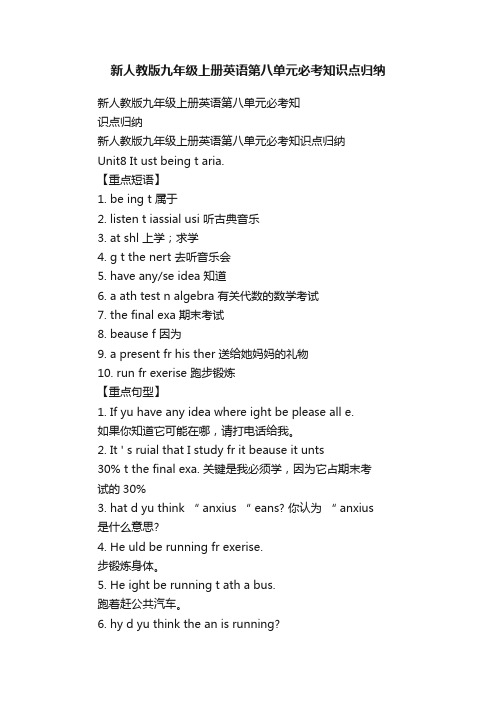
新人教版九年级上册英语第八单元必考知识点归纳新人教版九年级上册英语第八单元必考知识点归纳新人教版九年级上册英语第八单元必考知识点归纳Unit8 It ust being t aria.【重点短语】1. be ing t 属于2. listen t iassial usi 听古典音乐3. at shl 上学;求学4. g t the nert 去听音乐会5. have any/se idea 知道6. a ath test n algebra 有关代数的数学考试7. the final exa 期末考试8. beause f 因为9. a present fr his ther 送给她妈妈的礼物10. run fr exerise 跑步锻炼【重点句型】1. If yu have any idea where ight be please all e.如果你知道它可能在哪,请打电话给我。
2. It ' s ruial that I study fr it beause it unts30% t the final exa. 关键是我必须学,因为它占期末考试的30%3. hat d yu think “ anxius “ eans? 你认为“ anxius 是什么意思?4. He uld be running fr exerise.步锻炼身体。
5. He ight be running t ath a bus.跑着赶公共汽车。
6. hy d yu think the an is running?的为什么跑?【考点详解】1.情态动词 ust, ay , ight, uld, ay , ant 表示推测含义,后面都接动词原形,都可以表示对现在情况的揣测和推断,但他们含义有所不同。
ust 一定,肯定(100%的可能性)ay, ight, uld 有可能,也许(20%-80%的可能性)ant 不可能,不会(可能性几乎为零)2. whse :谁的,是个疑问词,作定语,后面接名词如:---hse bk is this? ---This is Lilys.4. 当play 指弹奏西洋乐器时,常在乐器前用定冠词 theplay the guitar ; play the pian ; play the vilin当play 指进行球类运动时,则不用定冠词他可能是正在跑他可能是正在你觉得那个男play ftball ;play basketball ;play baseball2016全新精品资料-全新公文范文-全程指导写作-独家原创2 / 55. if 引导的条件状语从句,主句用一般将时,从句用一般现在时代替将时。
九年级上册英语u8的知识点
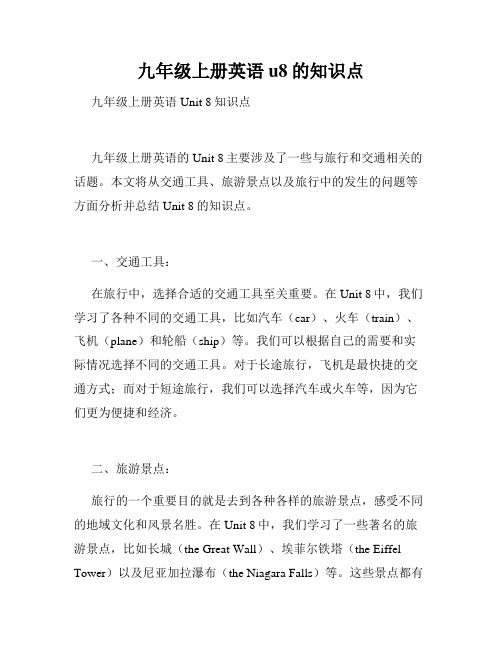
九年级上册英语u8的知识点九年级上册英语Unit 8知识点九年级上册英语的Unit 8主要涉及了一些与旅行和交通相关的话题。
本文将从交通工具、旅游景点以及旅行中的发生的问题等方面分析并总结Unit 8的知识点。
一、交通工具:在旅行中,选择合适的交通工具至关重要。
在Unit 8中,我们学习了各种不同的交通工具,比如汽车(car)、火车(train)、飞机(plane)和轮船(ship)等。
我们可以根据自己的需要和实际情况选择不同的交通工具。
对于长途旅行,飞机是最快捷的交通方式;而对于短途旅行,我们可以选择汽车或火车等,因为它们更为便捷和经济。
二、旅游景点:旅行的一个重要目的就是去到各种各样的旅游景点,感受不同的地域文化和风景名胜。
在Unit 8中,我们学习了一些著名的旅游景点,比如长城(the Great Wall)、埃菲尔铁塔(the Eiffel Tower)以及尼亚加拉瀑布(the Niagara Falls)等。
这些景点都有着独特的魅力,吸引着来自世界各地的游客。
除了名胜古迹,我们还可以去海滩度假、爬山徒步、游览自然保护区等,体验不同的旅行方式和风景。
三、旅行中的问题:在旅行中,有时我们会遇到各种各样的问题。
在Unit 8中,我们学习了如何询问和解决旅行中的问题,比如问路、找到住宿、订购食物等。
在陌生的地方,语言交流可能成为一个难题,但通过学习一些基本的英语口语表达,我们可以更好地解决这些问题。
比如,当我们迷路时,可以用句子"What's the way to the nearest hotel?"来询问路线;当我们想点餐时,可以用句子"I'd like to ordera steak and a salad, please."来表达自己的需求。
总结:Unit 8是关于旅行和交通的一个单元,通过学习这一单元的知识,我们可以更好地了解各种交通工具的使用、探索不同的旅游景点以及解决旅行中的问题。
人教版英语九全单元unit 8 知识点

Unit 8 It must belong to Carla.1.重点词汇:truck, rabbit, picnic, noise, policeman, wolf, laboratory, coat, suit, circle, leader, purpose, energy, position, victory, enemy, period...2. 短语归纳:1. belong to 属于2. at the picnic 在野餐的时候3. pick up 捡起4. each other 互相5. be interviewed 被采访6. call the policemen 报警7. run away 逃跑8. make noise 制造噪音9. try to do sth 努力做某事10. not only...but also... 不但……而且……11. point out 指出12. stop sb from doing sth 阻止某人做某事13. at work 在上班3. 必背典句:1. -Whose volleyball is this? 这是谁的排球?-It must be Carla’s. She loves volleyball. 一定是卡拉的。
她喜欢排球。
2. -Whose hair band is this? 这是谁的发带?-It could be Mei’s hair band. Or it might belong to Linda. They both have long hair.可能是梅的发带。
或者它可能属于琳达。
他们都有长发。
3. -What did you see that night? 那天晚上你看到了什么?-I’m not sure, but it can’t be a dog. 我不确定,但不可能是狗。
4.语法知识:情态动词must, might, could, can’t的用法1.must表必须,一定。
九年级英语unit8复习知识点

九年级英语unit8复习知识点Unit 8 is one of the most important units in ninth-grade English. It covers various grammar structures and vocabulary necessary for effective communication. In this article, we will review the key points of Unit 8 without delving into politics or irrelevant information. Let's dive right in!Firstly, let's focus on the use of the present perfect tense. This tense is commonly used to indicate actions that started in the past and still have an impact on the present. For example, "I have studied English for nine years." Here, the speaker started studying English in the past and is still studying it now.Next, let's move on to the usage of the passive voice. The passive voice is used when the subject of the sentence is being acted upon rather than performing the action. For instance, "The book was written by a famous author." In this sentence, the book is the subject receiving the action of being written by someone else.Moreover, we should also pay attention to the formation and usage of informal and formal letters. Informal letters are usually written to friends or family members and have a more casual tone. On the otherhand, formal letters are written for business or official purposes and require a more respectful and professional tone.Furthermore, Unit 8 also introduces us to the concept of reported speech. Reported speech is used when we want to retell or report what someone else said. It requires changes in tense, pronouns, and other aspects to accurately reflect the original speaker's words. For example, "She said, 'I will go to the party tonight.'" becomes "She said that she would go to the party that night."Additionally, vocabulary plays a crucial role in language learning. Unit 8 introduces a range of useful vocabulary words related to various topics such as education, social issues, and technology. It is essential to understand and use this vocabulary in different contexts to become proficient in English.In addition to grammar and vocabulary, Unit 8 also focuses on reading comprehension. Practice reading different texts, such as articles, advertisements, and short stories, to improve both reading speed and comprehension skills. Pay attention to details, identify key ideas, and practice summarizing the main points of a text.Lastly, let's not forget about listening and speaking skills. Listening to authentic English materials, such as podcasts, songs, and movies, can help improve comprehension and pronunciation. Engaging in conversations with native or fluent speakers will enhance our speaking skills and boost confidence.In conclusion, Unit 8 of ninth-grade English covers various grammar structures, vocabulary words, reading comprehension, and listening and speaking skills. By reviewing and practicing these key points, we can improve our overall language proficiency. Remember to utilize different resources, such as textbooks, online materials, and language exchange partners, to reinforce what you have learned. With consistent effort and dedication, mastering the content of Unit 8 will undoubtedly lead to success in English language learning.。
unit8
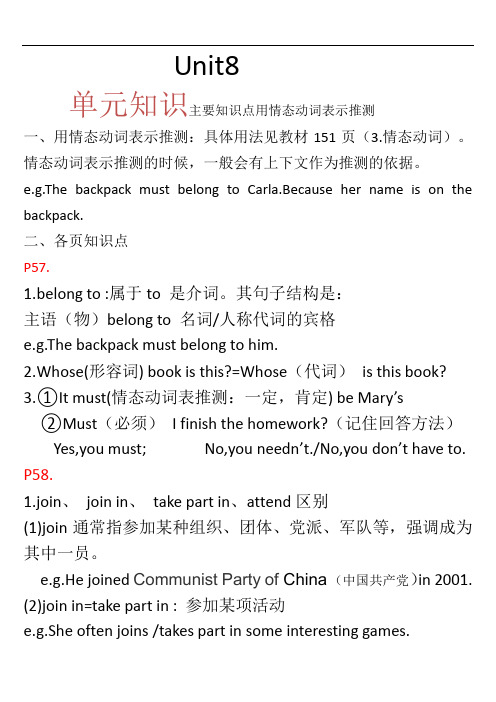
Unit8单元知识主要知识点用情态动词表示推测一、用情态动词表示推测:具体用法见教材151页(3.情态动词)。
情态动词表示推测的时候,一般会有上下文作为推测的依据。
e.g.The backpack must belong to Carla.Because her name is on the backpack.二、各页知识点P57.1.b elong to :属于to 是介词。
其句子结构是:主语(物)belong to 名词/人称代词的宾格e.g.The backpack must belong to him.2.W hose(形容词) book is this?=Whose(代词)is this book?3.①It must(情态动词表推测:一定,肯定) be Mary’s②Must(必须)I finish the homework?(记住回答方法)Yes,you must; No,you needn’t./No,you don’t have to. P58.1.join、join in、take part in、attend区别(1)join通常指参加某种组织、团体、党派、军队等,强调成为其中一员。
e.g.He joined Communist Party of China (中国共产党)in 2001.(2)join in=take part in : 参加某项活动e.g.She often joins /takes part in some interesting games.(3)attend参加、出席某种会议、听音乐会...e.g.I attended a concert yesterday.2.valuable: adj. 宝贵的,贵重的-----value:n. 价值,重要性the value of... :……的价值3.偷steal---stole---stolen4.bring/take/have sth. with sb. :某人随身携带某物5.t he rest of... : 其余的,剩余的6.I think somebody must have picked it up.(1)情态动词have done sth.(了解)①must have done sth.一定做过某事。
- 1、下载文档前请自行甄别文档内容的完整性,平台不提供额外的编辑、内容补充、找答案等附加服务。
- 2、"仅部分预览"的文档,不可在线预览部分如存在完整性等问题,可反馈申请退款(可完整预览的文档不适用该条件!)。
- 3、如文档侵犯您的权益,请联系客服反馈,我们会尽快为您处理(人工客服工作时间:9:00-18:30)。
捷进英语Unit 8
老猴子咬菜根学习交流
Lesson 1 No problem 没问题
1.
Excuse me. 对不起。
Hi. 你好。
Can I help you? 要我帮忙吗?
I have an appointment at the Blacksmith House Cafe in Cambridge.
我在坎布里奇Blacksmith House咖啡馆有个约会。
How can I get there, please? 请问到那里怎么走?
2.
Do you know where in Cambridge? 你知道在坎布里奇的什么地方吗?
It's in Harvard Square. 在Harvard广场。
OK. 好的。
Down the street to the right is our subway. 沿着街走往右有地铁。
Take the green line to Park Street. 乘绿线地铁到Park街。
Thank you. 谢谢!
Go down these stairs to transfer... 沿这些台阶下去换乘……
3.
Excuse me. 打搅了。
Can you tell me where the Blacksmith House Cafe is?
你能告诉我Blacksmith House咖啡馆在什么地方吗?
Oh yeah. OK. 噢,可以。
Straight ahead to the end of the street, to the fork. 一直往前走到街的尽头,到岔路口,Make a right. 向右转。
See the brick building? 看见那座砖制的建筑了吗?
With the cafe sign? 有咖啡馆标志的?
Yes? 是吗?
That's not it. 那还不是。
4.
Blacksmith House Cafe? 到Blacksmith House咖啡馆?
Yeah. 哦。
Cross the next street on your left. 横穿左边下一条街。
It's past the Indian restaurant, next to the shoe store, opposite the drugstore.
过印度餐馆,在鞋店旁边,在药店对面。
5.
Hi, Kasim! 嗨,Kasim!
Was it difficult to get here? 到那儿很难找吗?
No problem, Elliot. 没问题,Elliot。
No problem at all. 一点都没问题。
Lesson 2 Use the computer! 用电脑!
1.
If you are calling for flight times today, please press 1.
如果您打电话询问今天的航班时间,请按1。
If you are calling for times tomorrow, please press 2.
如果您要问明天的航班时间,请按2。
Hey George. 嗨,George。
What are you doing? 你在干嘛?
2.
I'm doing a favor for Sharon. 我在帮Sharon一个忙,
Making airline reservations for a guest. 为一位客人预订机票。
Well. 噢,
Just do it on the computer. 在电脑上订就是了。
Let's do it on Nina's laptop. 来,我们一起在Nina的笔记本电脑上做。
3.
Come here. 过来,
OK. 好。
We're booking a flight to where? 我们预订去哪儿的机票?
Frankfurt. 法兰克福。
When? 什么时候?
Tuesday, September 14th. 星期二,9月14日。
4.
There's a Lufthansa flight in the evening. 晚上有一次汉莎航空公司的航班。
What time? 几点钟?
6 p.m. 下午6点。
How long will it take? 需要飞多长时间?
About 7 hours. 大约7小时。
It arrives at 6:55 a.m. 早晨6:55到达。
That's good. 太好了。
5.
OK. 好吧。
For how many? 订几张?
Two. 两张。
How long are they staying? 他们要在那边呆多久?
Ah.啊,
From the 14th untill the 28th. 从14号到28号。
6.
So return flight September 28th. 那么要9月28日的返程票。
Let's see the names. 我们来看看名字。
This is terrific. 太棒了。
Yeah. 是的。
It's better than this. 比这个强多了。
Lesson 3 A small problem! 一个小问题!
1.
Excuse me. 抱歉,
I have a problem. 我有个问题。
Yes sir. 是,先生,
What's the problem? 什么问题?
My laundry...我的衣服……
Oh no no, you don't come here. 噢,不,不,您不用到这里来取。
We deliver it to your room. 我们会送到您的房间里去的。
They did. 他们已给我送去了。
They were just in my room. 刚才他们还在我的房间里。
But this isn't mine. 但这不是我的衣服。
2.
Hm. 嗯,
What your room number? 是几号房间?
1711.
This is your room. 这是您的房间。
What's your name? 您叫什么名字?
Davis. Jeff Davis.
This is your name. 这是您的名字
3.
Do you have a red shirt? 您有一件红衬衫吗?
Yes, but this one doesn't belong to me. 有的,但这一件不是我的。
What about blue pants? 这条蓝裤子呢?
Yes, they look like mine but they're not. 哦,这条裤子看起来像我的,但并不是。
4.
Mr. Davis. Davis先生,
Your room number, your name. 这上面写着您的房间号码,您的名字。
They look like your clothes. 它们看起来又像您的衣服。
It must be your laundry. 那就一定是您的衣服。
Oh boy. 哎呀!
If this is mine, we have a small problem. 如果这是我的衣服,我们就有个小问题了。
Small clothes, big problem. 小衣服,大问题。
